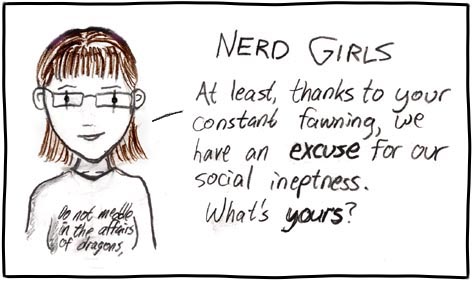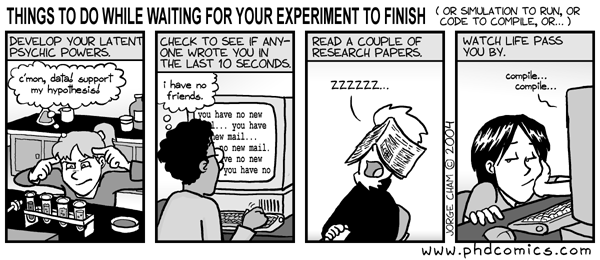Adventures of a Wetware Hacker
Saturday, July 28, 2007
Marvin Minsky, who, incidentally, is one of the most hilarious wise-asses I've ever met, said I have "physics envy", because I think that the key to AI is a simple but powerful theoretical basis to consciousness. Sort of a variant on Newton's Laws of Mechanics, or Maxwell's Laws of Electromagnetism. The "Laws of the Mind", so to speak. Minsky feels that there are a lot of complex mechanisms at work, and that we just need to get building them. This may be true, but I can't help but feel that the theoretical basis for true strong AI is lacking, and that the focus must change before we can truly succeed.
I would also like to comment that I think it is most likely that a woman will be the one to create true strong AI. We are, after all, the Mothers of our race. The first AI will be a virgin birth, and will change mankind forever, for better or for worse. An artificial Anti-Christ... How's that to piss off our religious brethren? ;-)
Cheers!
Wednesday, July 18, 2007
How do people continually deal with the existential vertigo inherent to studying the mind? Are preconceptions that successful in their salvation? How can people stand on the edge for hours, days, weeks at a time, looking into the abyss, hoping that -- for a moment -- the abyss will, indeed, stare back. For me, the most frightening and overwhelming moments are those spent staring into the nebulous concepts of consciousness, the ever unreachable comprehension of comprehension itself. The incredible distance between myself and this Invisible Hand, this Theory of Mind, is at once unavoidable and insurmountable. This is a battle that must be fought, although it will most certainly be lost. Perhaps it will be my downfall, but I maintain that it is a battle worth losing...
“Ooh, you look much tastier than Crabbe or Goyle, Harry,” said Hermione, before catching sight of Ron’s raised eyebrows and blushing slightly. –HP 7, Pg 50
**Note: I do not support or condone copyright infringement in any form, and am including this quote as a hideous example of terrible people who would actually do something so horrible as photograph and upload the entire 7th Harry Potter book.
As a further demonstration of my commitment to protecting the rights of Bloomsbury Publishers, I would like to remark upon how disgusting it is that I received the complete 7th Harry Potter book in jpg format. Email me for the link...
Friday, July 13, 2007
Wednesday, July 11, 2007
To PhD or not to PhD...
That is the question.
Whether tis saner in the mind
To suffer the slights and putdowns
Of outrageous faculty...
Or to take data despite advisor grumbles,
And by graduating, end them?
To graduate: to sleep, once more,
And by a PhD to say
We end the back-ache
And thousand financial debts that we are heir to.
Tis a commencement devoutly to be wish'd.
To graduate, to sleep...
To nap: perchance to dream...
Ay, there's the rub!
For in that PhD what dreams may come,
When we have shuffled off this campus soil?
For who would bear the whips and scorns of time,
The professor's wrong, the undergrad's contumely.
The pangs of dispriz'd love, the experiment's delay,
But that the dread of something after graduation,
The undiscovered country from whose bourn no slacker returns,
Puzzles the will and makes us rather bear those ills we have,
Than fly to others that we know not of?
Thus cowardice does make procrastinators of us all,
And lose the name of action.
-PhD Comics
Tuesday, July 10, 2007
The $300 Linux-Powered 'iPhone Killer' Arrives
 After seemingly endless delays, the OpenMoko phone is here. The first version of the NEO 1973 mobile phone, which carries the Linux kernel inside and is not locked to a specific network, is available for purchase from OpenMoko.com. It's not as jaw-droppingly pretty as the iPhone, but it shares a design philosophy -- no buttons, just a screen -- and it's ready to be loaded with any number of open-source software applications. (Though, according to Gadget Lab, so is the iPhone).
After seemingly endless delays, the OpenMoko phone is here. The first version of the NEO 1973 mobile phone, which carries the Linux kernel inside and is not locked to a specific network, is available for purchase from OpenMoko.com. It's not as jaw-droppingly pretty as the iPhone, but it shares a design philosophy -- no buttons, just a screen -- and it's ready to be loaded with any number of open-source software applications. (Though, according to Gadget Lab, so is the iPhone).
The base version of the NEO sells for $300. It has a 2.8" VGA touch screen, a micro SD card slot, a USB port and 2.5G GSM quad band capability.
Keep in mind that this unit (the GTA01) was pushed out early so developers could begin writing device drivers, custom GUIs and some cool apps for the phone. The next revision (GTA02), which will be available starting at $450 in October, will be ready for the mass market. It will have wi-fi, 3-D motion sensors and added graphics accelerators. So this phone isn't exactly an iPhone killer -- the next one will be a contender. AptUsTech has a nice comparison of the NEO 1973 and the iPhone.
When it comes to devices, more choice is almost always "a good thing." But will consumers respond to the NEO? We all know developers are going to dig this phone. But what's more important to consumers -- a super-sexy status item that's locked to one carrier and one set of functions, or a less sexy look-alike with a fully free and open software system?
Sunday, July 08, 2007

Things I Learned from Die Hard 4:
- In the future, we will have biological transistors that allow us to download an entire server onto a PDA. And by future, I mean now.
- Palms, Treos, and Sidekicks are all you need to hack into NSA and save the world. As long as you don't get shot. (No iPhone necessary.)
- A bullet in the kneecap doesn't really impair your ability to walk.
- Contrary to the work we do in the lab, BioWatch sensors actually react instantly, setting off big red alarms within moments. I've gotta tell Slezak about this on Monday; at this point he's just wasting his time.
- Move over, Chuck Norris. Bruce Willis cannot die.

The sequence is that of a gene on chromosome 6p22, involved in neuronal migration and intelligence in humans. If you're interested in being on Chicago's SynBio team next year, contact me.
Wednesday, July 04, 2007
On an entirely unrelated note, I must at length describe how much I am fascinated with and impressed by the writing of Friedrich Nietzsche. Cliche, I'll admit, but true nevertheless. Everytime I pick up work by that man, I am absorbed for hours, almost without exception. There is such good in that evil, it's really quite delightful. Nietzsche was a man who loved to shock and anger, but believed he was doing the right thing by going about it. His outright rejection of the Christian (or any) God was the first step, he felt, on the path to morality. The famous quote from The Gay Science (see below) describes the death of the concept of God; modern man no longer finds God convincing. Science has no use for that hypothesis.
While this quote is frequently and annoyingly misconstrued as a sign that Nietzsche is just pure evil, it signifies, to him, the loss of something necessary. With the death of God, man lost morality; with the advance of science and rational thought, Western civilization lost its defining and uniting approach to life, as a shared cultural set of belief fully within which people had lived their lives.
To Nietzsche, this was just bad news. Hear the wonderfully articulated anguish in his tone:
Have you not heard of that madman who lit a lantern in the bright morning hours, ran to the market-place, and cried incessantly: "I am looking for God! I am looking for God!"
As many of those who did not believe in God were standing together there, he excited considerable laughter. Have you lost him, then? said one. Did he lose his way like a child? said another. Or is he hiding? Is he afraid of us? Has he gone on a voyage? or emigrated? Thus they shouted and laughed. The madman sprang into their midst and pierced them with his glances.
"Where has God gone?" he cried. "I shall tell you. We have killed him - you and I. We are his murderers. But how have we done this? How were we able to drink up the sea? Who gave us the sponge to wipe away the entire horizon? What did we do when we unchained the earth from its sun? Whither is it moving now? Whither are we moving now? Away from all suns? Are we not perpetually falling? Backward, sideward, forward, in all directions? Is there any up or down left? Are we not straying as through an infinite nothing? Do we not feel the breath of empty space? Has it not become colder? Is it not more and more night coming on all the time? Must not lanterns be lit in the morning? Do we not hear anything yet of the noise of the gravediggers who are burying God? Do we not smell anything yet of God's decomposition? Gods too decompose. God is dead. God remains dead. And we have killed him. How shall we, murderers of all murderers, console ourselves? That which was the holiest and mightiest of all that the world has yet possessed has bled to death under our knives. Who will wipe this blood off us? With what water could we purify ourselves? What festivals of atonement, what sacred games shall we need to invent? Is not the greatness of this deed too great for us? Must we not ourselves become gods simply to be worthy of it? There has never been a greater deed; and whosoever shall be born after us - for the sake of this deed he shall be part of a higher history than all history hitherto."
Here the madman fell silent and again regarded his listeners; and they too were silent and stared at him in astonishment. At last he threw his lantern to the ground, and it broke and went out. "I have come too early," he said then; "my time has not come yet. The tremendous event is still on its way, still travelling - it has not yet reached the ears of men. Lightning and thunder require time, the light of the stars requires time, deeds require time even after they are done, before they can be seen and heard. This deed is still more distant from them than the distant stars - and yet they have done it themselves."
It has been further related that on that same day the madman entered divers churches and there sang a requiem. Led out and quietened, he is said to have retorted each time: "what are these churches now if they are not the tombs and sepulchres of God?"
This is, again, bad news for Nietzsche, who feels that people behaving decently is more important than any sort of rational thought, and also feels that people are most likely to behave decently when they have some sort of uniting goal for which to strive. Hence, the Ubermensch. By replacing the far-fetched concept of God with something he felt was easier and more desirable, Nietzsche felt he was doing his part to help that detested mankind.
"I teach you the Overman. Man is something that shall be overcome. What have you done to overcome him? All beings so far have created something beyond themselves; and do you want to be the ebb of this great flood and even go back to the beasts rather than overcome man? What is the ape to man? A laughingstock or a painful embarrassment. And man shall be just that for the Overman: a laughingstock or a painful embarrassment..."
In his literary masterpiece, Thus Spake Zarathustra, Nietzsche gives us a protagonist who contends that "man is something which ought to be overcome" (sounds a little bit like House, MD). Zarathustra thus announces the coming of the Ubermensch (Overman, Superman, Homo superior), which must succumb to nihilism in order to defeat it. Zarathustra charges his followers to prepare for the Superman, in three quick and easy steps: 1) Use your will to power destructively, in the rejection of societal ideals and moral codes, 2) Use your will to power creatively, by overcoming nihilism and the re-evaluation of old ideals and creation of new ones, 3) Undergo a continual process of self-overcoming.
Nietzche, as can be imagined, really didn't like silly ideas such as the soul, personal consciousness, or the ego. He destroys arguments that use metaphysics, and hates individualistic societies that would view the Superman as a hero. It always seemed to me that Nietzsche loved Buddhism, but hated Buddhists.
However, the Superman is generally not interpreted as a person (Nietzsche hates people, remember), but as a state or occurrence of multiple wills to power undergoing the existential process of overcoming both oneself and nihilism. Naturally, Nietzsche also hated free will (what a silly concept in the first place! Free will! Ha!), so his instructions were, he knew, just general advice that would or wouldn't be followed. No one, he claimed, can choose to be the Superman; it's just something that will happen when the time is right.
Given the proper conditions, man will transcend himself.
Tuesday, July 03, 2007
From: berke@mit.edu
Subject: Things to amuse you while you're at work and I'm not
1. Cadaver Dissection Videos
http://www.lawrencegaltman.com
2. Very Old Anatomy Drawings
http://www.nlm.nih.gov/exhibit
3. Predictably, Scientists are much better than writers at Explaining Science
http://observer.guardian.co.uk
Jean-Paul Sartre is sitting at a French cafe, revising his draft of Being and Nothingness. He says to the waitress, "I'd like a cup of coffee, please, with no cream." The waitress replies, "I'm sorry, monsieur, but we're out of cream. How about with no milk?"






